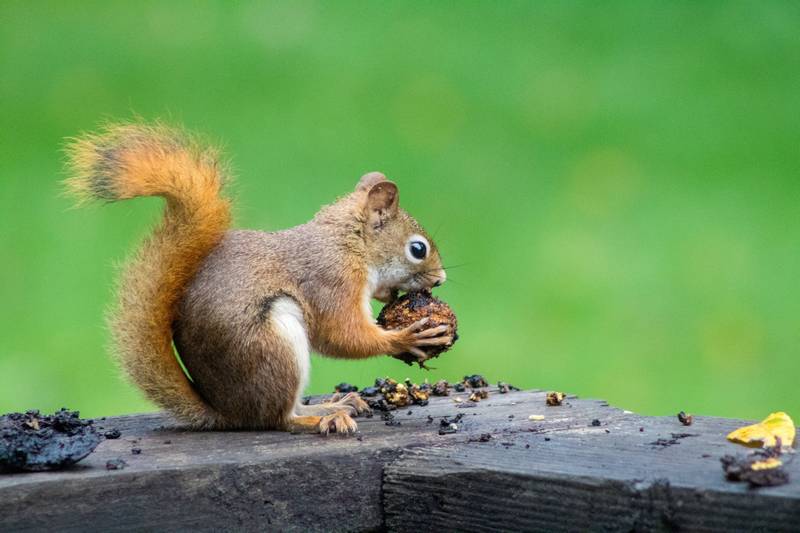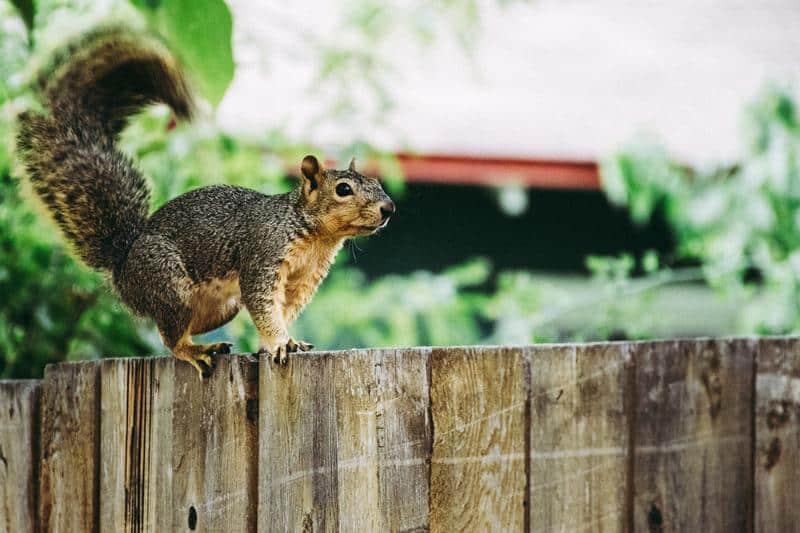Why Do Dogs Bark at Squirrels? (+ How to Stop It!)
Is your peaceful afternoon being disrupted by your dog barking at squirrels? This is a common problem for many dog owners, especially those who live near wooded areas or parks.
In this article, we’ll uncover the reasons behind why dogs bark at squirrels. More importantly, we’ll provide you with an easy-to-follow guide on how to stop this behavior. We’ll also dive into specific issues like dogs who only bark at squirrels at night, and what to do if your dog lunges and barks or if a puppy won’t stop barking at squirrels.
If you’re ready to make your home a little quieter, read on!
Dog Barking at Squirrel: How to Stop

Dogs are often fascinated by squirrels and barking at them is a common response. It’s a display of their instinctual predator-prey drive. However, constant barking at squirrels can become disruptive, especially if you live in a neighborhood filled with these small creatures. Here’s how you can manage this behavior:
How to Stop Dog Barking at Squirrels
- Remove the stimulus: If possible, try to keep your dog away from windows or areas where they can see squirrels. If you have a yard, you may need to make it less attractive to squirrels by removing bird feeders or sealing garbage cans.
- Distraction and Redirection: Distract your dog when they start barking at squirrels. This could be with a toy, a command, or a treat. Over time, they may start to associate the presence of squirrels with positive rewards rather than an opportunity to bark.
- Training: Teach your dog the “quiet” command. Start by saying “quiet” when your dog is barking, then rewarding them when they stop. With repetition, your dog can learn to associate the command with the action of ceasing to bark.
- Counter-Conditioning: This involves changing your dog’s emotional response to squirrels. Instead of viewing them as something to bark at, you want your dog to associate the sight of squirrels with something positive, like treats or toys.
Keep in mind that consistency and patience are key. It may take time for your dog to break this habit, but with persistence, you can make progress. Also, remember to always use positive reinforcement methods and avoid punishment, as it can lead to further behavioral issues.
But while these steps will get your dog to stop barking at squirrels, it’s important to remember that the underlying behavioral issues (prey drive, territoriality, overexcitement, etc.) that were causing all of this to begin with will still be present. And until you address those, any positive changes you see are only going to be temporary.
“Well, how do I make these changes last?”
By getting your dog to truly choose to follow your direction, that’s how. I tried many times to write out how you can do that before deciding it made more sense to just link you to the free video series that explains it better than I’d ever be able to.
The series is by a man named Dan who is one of the world’s leading dog obedience trainers. In it, he teaches you how to put an end to things like when your dog barks at squirrels and all other misbehavior using his fast and easy-to-follow methods.
In the first video, Dan will reveal to you why the two most common methods of dog training only doom you to failure. You can watch the video now by clicking here. Follow the proven system he’ll show you in his series and you’ll never have to spend another second worrying about your dog barking at squirrels ever again!
Why Does My Dog Bark at Squirrels?

If you’ve ever wondered, “Why do dogs bark at squirrels?” you’re not alone. This is a common issue among pet owners. These small, fast creatures tend to catch the attention of dogs, often leading to persistent barking. The reasons behind this behavior can be attributed to several factors.
Prey Drive
The primary reason dogs bark at squirrels is due to their instinctual prey drive. Dogs are descendants of wolves, and hunting small game is a part of their heritage. When they see one, it can trigger this innate hunting instinct, causing them to bark and chase after the squirrel.
Excitement
Dogs can also bark at squirrels out of sheer excitement. Squirrels are quick and unpredictable, making them particularly enticing for dogs. The sudden appearance and swift movements of squirrels can be stimulating for dogs (who we all know love running after each other), hence the barking.
Guarding Territory
Another reason dogs bark at squirrels is to protect their territory. Dogs are naturally territorial animals, and they may view squirrels as invaders just the same as someone biking or walking past. Barking is their way of warning the squirrel to stay away, and alerting their human family of the potential ‘threat.’
Frustration
Finally, barking at squirrels can be a sign of frustration. If a dog is leashed or behind a window and can’t get to the squirrel, they may bark out of annoyance. This is known as barrier frustration. It can also be a way for them to expend energy, especially if they’re not getting enough exercise.
Understanding why dogs bark at squirrels can help address the behavior more effectively. Remember, barking is a form of communication for dogs, and it’s not always a bad thing. However, if the barking becomes excessive or they will not stop when commanded, you need to address the underlying issue. Go back to the first section now and we’ll explain how to do that.
Dog Barks at Squirrels Outside at Night Only
Dogs barking at squirrels outside at night only is obviously going to frustrate you and everyone in the neighborhood. Let’s explore some possible reasons why your dog exhibits this behavior and what you can do about it.
- Increased Sensory Stimulation: Squirrels are active creatures, especially during dawn and dusk when they are foraging for food. The movement and sounds they make can trigger your dog’s predatory instincts, leading to barking. The darkness of the night may enhance your dog’s senses, making them more alert to the presence of squirrels.
- Guarding Territory: Dogs are naturally protective of their territory, and squirrels moving around outside can be seen as intruders. Your dog may bark at them to ward off what they perceive as a potential threat to their domain.
- Lack of Stimulation: Dogs need regular mental and physical exercise to keep them engaged and prevent boredom. If your dog is not getting enough stimulation during the day, they may become hyperactive at night, barking at any perceived movement or noise, including squirrels.
- Lack of Training and Reinforcement: If your dog has not been properly trained to control their barking behavior, they may develop a habit of barking at squirrels. In some cases, unintentional reinforcement from the owner, such as attention or excitement when the dog barks, can inadvertently reinforce the behavior.
Here are some tips to help you address this behavior:
- Increase Exercise and Mental Stimulation: Ensure your dog gets enough physical exercise and mental stimulation throughout the day. Engage them in interactive play, provide puzzle toys, and consider regular walks or playdates with other dogs to help release excess energy.
- Create a Calming Environment: Make your dog’s sleeping area or crate comfortable and inviting. Create a calming ambiance by using low lighting, playing soothing music, or using a white noise machine to mask outdoor sounds that may trigger barking.
- Use Positive Reinforcement Training: Teach your dog the “quiet” command and reward them with treats and praise when they respond appropriately. Redirect their attention to a more desirable behavior, such as sitting or lying down, and reward them for calm and quiet behavior.
- Block Visual Access: If your dog’s barking is triggered by seeing squirrels through windows, consider blocking their view with curtains, blinds, or window film. This can help reduce their visual stimulation and decrease the barking response.
Remember, consistency, patience, and positive reinforcement are key when addressing any unwanted behavior. By understanding the underlying reasons for your dog’s barking and implementing appropriate training techniques, you can help them develop more desirable behaviors and stop their barking at squirrels outside at night. Learn how to do that in the first section of this article.
How to Desensitize Dog to Squirrels
If squirrels are causing your dog to become overly excited or distracted, you’re not alone. A lot of dogs have this reaction. But with some time and effort, you can help your dog learn to stay calm when squirrels are around. Here’s a simple step-by-step guide to do just that:
- Start Inside: Begin by training inside your home where there are fewer distractions. Start by showing your dog pictures or videos of squirrels. This way, your dog can start to get used to squirrels without the real thing there to stir up too much excitement. Try to spend a little bit of time on this each day, gradually making the training sessions longer as your dog becomes more comfortable.
- Use Treats: Giving your dog a favorite treat when they stay calm while looking at the squirrel images or videos can help them make a positive connection. Over time, they will start to understand that staying calm when they see a squirrel leads to a tasty reward. Use treats that your dog really loves for this – the better the treat, the stronger the connection will be.
- Try It Outside: Once your dog is doing well with the images and videos inside, it’s time to move the training outside. Find a spot where your dog can see squirrels from a distance. The goal here is for your dog to observe the squirrels without having the opportunity to chase after them. While you’re outside, keep rewarding your dog with treats whenever they stay calm. This helps to reinforce the positive connection between staying calm and seeing squirrels.
- Get Closer: After your dog is comfortable seeing squirrels from a distance, you can start to gradually decrease the distance between your dog and the squirrels. Keep giving your dog treats for staying calm. If they start to get excited or stressed, take a step back and increase the distance again. The key here is to let your dog get used to being near squirrels without feeling the need to chase or get overly excited.
- Keep It Up: Consistency is key when it comes to training a dog. Try to do the training sessions each day if you can. The more regular the training, the faster your dog will learn to stay calm around squirrels.
Remember, every dog is different. Some might take longer to get used to squirrels than others, and that’s perfectly fine. The goal is to help your dog understand that they don’t need to get worked up every time they see a squirrel. For more help on addressing any underlying issue causing all of this, go back to the first section now.
My Dog Lunges and Barks at Squirrels
If your dog lunges and barks at squirrels, it can make your walks stressful. This behavior is pretty normal for dogs, as squirrels are fast, and their movement triggers the dog’s chase instinct. However, you can teach your dog to stay calm and not lunge at squirrels. Here are some steps to guide you through this:
- Understand the Behavior: Dogs often lunge because they’re excited or want to play. But sometimes it’s because they’re scared or trying to protect you. Understanding why your dog is lunging at squirrels can help you figure out the best way to train them.
- Keep a Safe Distance: If your dog tends to lunge at squirrels, try to stay far enough away that your dog doesn’t react. This distance is different for every dog. For some dogs, it might be across the park. For others, it might be across the street.
- Train ‘Sit’ and ‘Stay’: Teaching your dog to sit and stay is a great way to control their behavior. Practice these commands at home first, then try them in a park or a place with squirrels. If your dog starts to lunge, tell them to sit and stay. Then reward them when they do.
- Use Treats for Distraction: When you see a squirrel and your dog hasn’t noticed yet, get their attention with a treat. Once they’re focused on you and the treat, they’re less likely to notice the squirrel and lunge.
- Practice Regularly: Like all training, teaching your dog not to lunge at squirrels will take time and consistency. The more you practice, the better your dog will get at staying calm around squirrels.
These steps should help reduce your dog’s lunging behavior. Remember to stay patient, and don’t punish your dog for their instincts. With time and regular training, your dog will start to stay calm even when there are squirrels around. For more help on addressing the problem which is ultimately causing this, go back to the first section of this article now.
Puppy Won’t Stop Barking at Squirrels
If your puppy won’t stop barking at squirrels, it’s obviously going to be concerning. The constant noise is stressful, and you worry about how this will develop as your dog grows older. Puppies are full of energy and curiosity, which can amplify this behavior. Let’s talk about the reasons behind the barking and how to apply appropriate training methods.
Why Puppies Bark at Squirrels
Puppies bark at squirrels primarily due to their prey drive, an instinct inherited from their ancestors. The quick, erratic movement of squirrels excites puppies, triggering the urge to chase. Furthermore, puppies may bark due to frustration, particularly if they are leashed or behind a window and can’t reach the squirrel.
Teaching the ‘Quiet’ Command
One way to control your puppy’s barking at squirrels is by teaching the ‘quiet’ command. Start this training in a calm, distraction-free environment. Let your puppy bark a few times, then say ‘quiet’ in a firm but calm voice. When your puppy stops barking, reward them with a treat or praise. Practice this regularly before attempting it when a squirrel is present.
Redirecting Attention
Another effective method is to redirect your puppy’s attention when they start barking at a squirrel. You can do this with a favorite toy or treat. This tactic helps your puppy associate seeing a squirrel with a positive experience, rather than an urge to bark and chase.
Remember, patience is key when dealing with a puppy barking at squirrels. Puppies are learning about the world, and understanding this behavior will take some time. Stay consistent with your training, and eventually, you’ll see improvements. For more help on addressing this problem, go back to the first section of this article now.
Now that you know how to stop your dog from barking at squirrels, I’m sure you’re looking forward to being able to go out into the backyard or on a walk free of worry, so I’ll let you get started! Best wishes, and thanks for reading “Why Do Dogs Bark at Squirrels? (+ How to Stop It!)”





